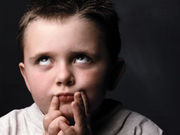Spanking: More Harm Than Good?
It can lead to psychological, learning problems in kids, analysis of 75 studies suggests.
Spare the rod and spoil the child.

Not so fast, suggests a new review that found spanking doesn't produce better behavior and may set up a child for psychological and learning problems later.
"Spanking is not achieving parents' goals," said expert. "Children have more mental health problems the more they are spanked. They have lower cognitive ability, scoring lower on achievement tests."
Another child development expert said the study findings, based on an analysis of five decades of research, should give parents pause when it comes to corporal punishment.
"Parents need to reconsider the role of spanking in the disciplining of children," said expert. "I think this is a pretty good study that supports the idea there is no positive outcome from spanking of children."
While the research doesn't prove cause-and-effect, expert said, "It shows a correlation with negative outcomes. If it were good, we would have [found] correlations in the other direction. But the correlations are all negative."
In the review, the researchers analyzed 75 studies that examined spanking. The aim was to determine the effects -- both immediate and long-term -- of spanking a child.
They only looked at spanking that involved "a swat on the behind with an open palm," expert said, and not spanking that was done with an object such as a paddle. All of the studies were published between 1961 and 2014, and more than 160,000 children were included in the analysis.
The researchers found that spanking was linked with 13 of the 17 outcomes they examined, and all were negative. The outcomes included levels of aggression, mental health problems and lower thinking skills, among others.
Four outcomes -- immediate defiance, alcohol or substance abuse in childhood, alcohol or substance abuse in adulthood, low self-regulation -- were also linked to spanking, but the association wasn't strong enough to be considered statistically significant, expert said.
Still, 80 percent of parents worldwide spank their children, according to the study. In the United States, expert said, the percentage is slightly higher, about 85 percent, citing a recent national survey.
Advocates contend that spanking is an effective form of discipline, using the reasoning that they were spanked as children and turned out fine.
However, the American Academy of Pediatrics advises against physical punishment.
Expert said most parents become frustrated at times with their children's behavior, and most at some point feel like "they want to hit them. But there is never a reason to do it. There are always better ways to communicate our frustration" .
Expert cited this example: When a child doesn't share a toy and hits his sibling with it, give attention to the hurt child first, she suggested, then tell the other child it's not OK to hurt people. Either take the toy away for a specified period or tell him if he plays well with his sibling for the next half hour he may earn the toy back.
Expert agreed that alternative methods such as timeouts and discussions are better than spanking. Expert also suggested parents consult with their pediatrician, who knows their child, for other ideas.
Source: HealthDay News
- 379 reads
Human Rights
Fostering a More Humane World: The 28th Eurasian Economic Summi

Conscience, Hope, and Action: Keys to Global Peace and Sustainability

Ringing FOWPAL’s Peace Bell for the World:Nobel Peace Prize Laureates’ Visions and Actions

Protecting the World’s Cultural Diversity for a Sustainable Future

Puppet Show I International Friendship Day 2020

